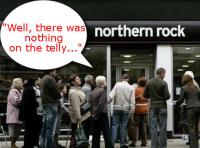Credit Crunch: Northern Rock Challenges Bank of England’s Independence
 AS Anatole Kaletsky points out in the Times today there’s one thing that will disappear (if in fact it ever existed) as a result of the credit crunch and the Northern Rock goings on: the Bank of England’s independence.
AS Anatole Kaletsky points out in the Times today there’s one thing that will disappear (if in fact it ever existed) as a result of the credit crunch and the Northern Rock goings on: the Bank of England’s independence.
It was, you may recall, almost the first thing Gordon Brown did on becoming Chancellor in 1997, making the BoE independently responsible for the setting of interest rates. They were given a target of 2% inflation and told to get on with it, as opposed to the earlier system when it was the Chancellor who actually decided the short term interest rates.
So far so very god but this independence took something of a knock when the Chancellor some years later changed the measure of inflation that that 2% target should hit. From one that included housing costs to one that did not….just as housing prices were climbing strongly and would have indicated that interest rates should rise. So, err, not all that independent then.
The current threat to such independence is that, given what has happened, perhaps the BoE shouldn’t be responsible for crisis management? If that is the case then the market dealings part would need to move to Treasury control.
But, the way that the BoE actualy controls interest rates is through those very market dealings. Meaning, in effect, that while the Bank would be responsible for interest rates, they couldn’t in fact do all that much about them.
Which leads to (and with the way that various politicians are talking about “interest rates should do this” “they should do that”) the thought that while Brown’s one and only universally agreed to be sensible act since 1997 might stay in name, the Bank of England’s independence is about to be taken away in substance.
Posted: 27th, September 2007 | In: Money Comments (4) | TrackBack | Permalink


